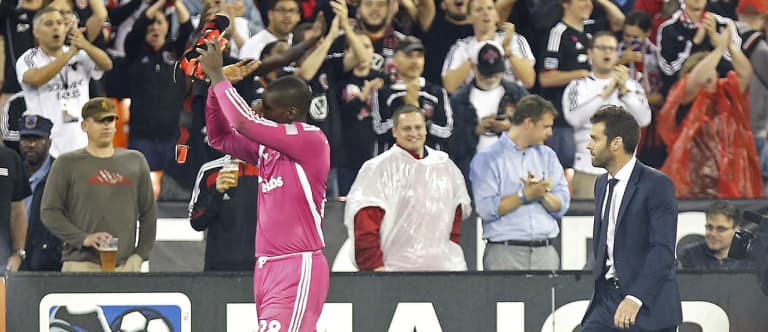WASHINGTON, D.C. -- As Bill Hamid departs the self-described “most decorated club in American soccer,” it may be tempting to rank his D.C. United legacy clearly behind the club’s early legends.
It would also be a grievous mistake.
Hamid may not have won as many trophies as Jaime Moreno, John Harkes, Marco Etcheverry, Eddie Pope or Ben Olsen. And he is yet to seize the US national team role so many have predicted for him.
But those others found success on East Capitol Street in a club culture that was ahead of the game during Major League Soccer’s early years.
Hamid did the same during a time when club’s future looked uncertain and at times even bleak, emerging as the driving force behind a team that experienced considerable ups and downs. All the while, he was never afraid to dream bigger, culminating in his move to Denmark’s FC Midtjylland and hopes of another subsequent move to an even bigger European stage.
“We love the kid,” says D.C. GM Dave Kasper. “He’s really wanted this. Every offseason, as far as I can remember, he was in my office, he was in Ben’s office, talking about, ‘Where can I go train? I want to get seen. I want some exposure. I want to feel this. And I want to talk about a potential move.’ And that day’s finally here for him, and we wish him all the best.”
Hamid’s departure also solidifies D.C.’s place as a productive MLS academy since the creation of the Homegrown Player rule.
The Northern Virginia native was not only the club’s first such signing, but the league’s fourth. He joins Andy Najar as United’s second to depart for a European club with recent UEFA Champions League credentials.
Among other D.C. Homegrowns, Ethan White has contributed regularly for New York City FC when healthy, Collin Martin has appeared in a career-high 11 matches for Minnesota United this season, and Jalen Robinson has drawn mostly positive reviews in limited action for D.C.
And amid the heightened discussions surrounding US player development following the national team’s failure to qualify for the 2018 FIFA World Cup, Hamid’s story embodies everything the MLS academy system is supposed to achieve.
The child of immigrant parents from Sierra Leone who moved to Northern Virginia, he was an extremely talented but raw youth player outside the archetype of your typical American prospect.
It’s hard to imagine now looking at the finished product, who won 2014 MLS Goalkeeper of the Year. But his development was a long, sometimes painful grind.
“When he first came here, [he was] not really ready for the demands of pro soccer,” Olsen, now the D.C. coach, tells MLSsoccer.com. “Bill will be the first to say that we have had more meetings and more one-on-ones with Bill over the last eight years than any player that I’ve ever had. Some good, some bad. Some reminding him of the challenges and the responsibilities that we demand or his teammates demand.”

USA Today Sports Images
The end product is a goalkeeper who is opting for the hard road again, when the benefits of staying with D.C. are greater than at any other time during his tenure.
The club is set for its long-awaited move to Audi Field next summer and, according to The Washington Post, was prepared to double Hamid’s salary to $700,000 per year.
The summer signings of internationals Paul Arriola and Zoltan Stieber, and the promise of more this offseason suggests Hamid could’ve had the most talented team of his D.C. career in front of him in 2018.
Hamid admits some of his European move owes to his desire to become a more permanent fixture with the US. While now-departed coach Bruce Arena appeared to have Hamid in his longer-term plans, European success could separate Hamid from the others in the race to succeed veterans Tim Howard, Brad Guzan and Nick Rimando.
But this departure is as much about Hamid the person as the player. And that should be what Black-and-Red supporters ultimately remember.
“The strongest imprint that I want to have is as a young man from this neighborhood that had the dream,” Hamid says, “and he made the most of that opportunity. And then throughout that opportunity, he inspired the next generation of kids from this neighborhood that want to play for this team to work and push themselves and make this team and then inspire another generation of kids.
“And I hope that I inspire kids all over the country to do that within their own regions or within their cities. Because being a Homegrown Player is special in this league.”












